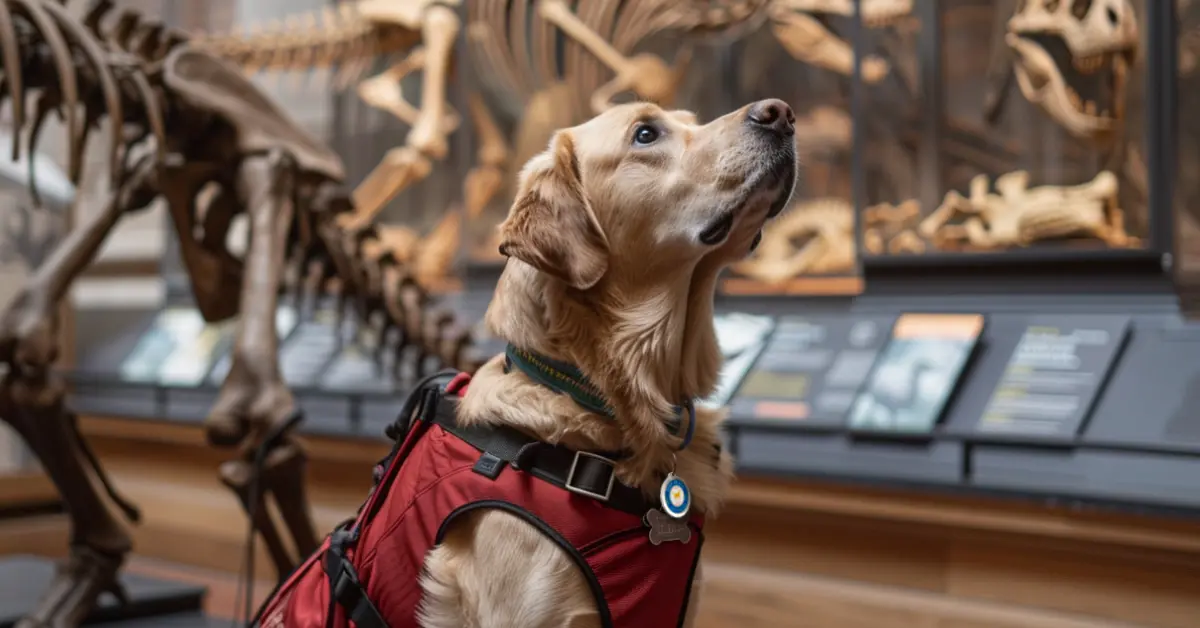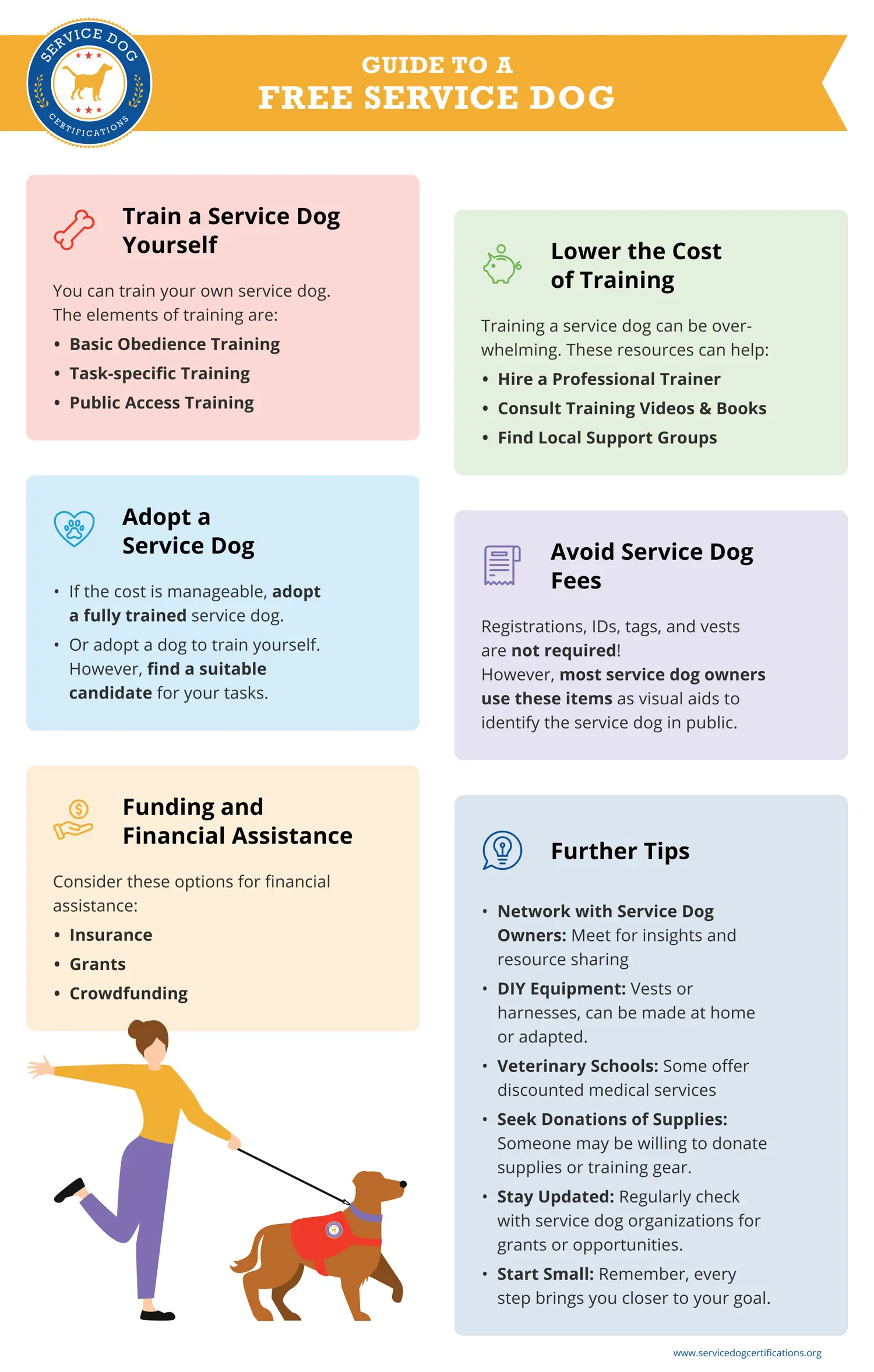How to Get a Service Dog for Free

A service dog can completely change your life, but with price tags often between $30,000 and $50,000 to purchase a fully trained service dog, they can seem financially out of reach. The bright side is that there are ways to bring a service dog into your life without emptying your bank account. In this article, we’ll discuss the five ways you can get a service dog (or psychiatric service dog) for free, or nearly free.
In this article:
- Nonprofit service dog organizations
- Training your own service dog
- Tax benefits and healthcare accounts
- Veteran-specific programs
- Reducing acquisition and care costs for service dogs
- Frequently asked questions about free service dogs
Nonprofit Service Dog Organizations
There are nonprofit organizations that raise, train, and match service dogs with recipients at no cost. Their work is funded through donations, grants, and volunteer efforts, which means they can cover the substantial costs of training canines to help people with ADA disabilities.
When you apply to one of these organizations, you’ll go through an evaluation process to see if you’re a good fit. If accepted, you’ll be matched with a dog specifically trained for your needs. Some organizations even provide handler training to help you and your new service dog become a successful team. Keep in mind, however, that there is high demand for these services, and the waiting lists can be years long.
Here are some organizations that might be able to help you get a service dog at no cost:
For a Range of Disabilities
Canine Companions is an amazing organization that provides free service dogs and serves adults, children, and veterans with physical disabilities. Founded in 1975, they are one of the nation’s first accredited service dog providers. Each dog lives with volunteer puppy raisers for 18 months, followed by 5-9 months of professional training. The application process starts with basic information exchange to determine fit, followed by interviews conducted by experienced staff. All services are provided completely free of charge, including follow-up support after placement.
Freedom Service Dogs has earned acclaim for their commitment to transforming lives through canine partners. Founded in 1987, they serve veterans with PTSD, adults with mobility challenges, and children with autism. Their application process involves completing an online pre-application questionnaire, followed by a full application with supporting documentation and interviews. It costs them $30,000 to $50,000 to train each dog, but they provide these incredible animals at no cost to qualified recipients through funding from donations and grants.
NEADS World Class Service Dogs is an exceptional organization that has placed over 1,900 service dog teams nationwide since 1976. They offer service dogs for adults, children, veterans with PTSD, and people with hearing loss. Their application process begins with an online pre-qualifying questionnaire, followed by a detailed application that takes about 45 minutes to complete. All dogs undergo comprehensive training to assist with specific tasks related to their handler’s disability.
For Children With Autism
Paws With A Cause is a great organization that has been changing lives since 1979 and focuses on providing dogs to those with disabilities while also advocating for the rights of assistance dog teams. They train service dogs, hearing dogs, seizure response dogs, and service dogs for children with autism spectrum disorder. For their autism program, children must be between 4 and 12 years old (applications received by the child’s 7th birthday) and have a parent or guardian trained as a facilitator.
For Hearing Dogs
Dogs for Better Lives is an incredible organization that specializes in training hearing dogs to alert people to important sounds in their environment, such as doorbells, alarm clocks, or someone calling their name. Founded in 1977, they train and place professionally certified hearing dogs with people who are deaf or hard of hearing across the United States at no cost to recipients. Their dogs are primarily selected from shelters, giving these animals a second chance at life while providing an essential service.
For Visual Impairment Guide Dogs
Fidelco Guide Dog Foundation is an exceptional organization that focuses specifically on providing German Shepherd guide dogs to people with visual impairments. To apply, you must be legally blind, have had orientation and mobility training or have used a guide dog, must be capable of cane travel, and meet other requirements that ensure you’re a good fit for one of their guide dogs.
Submitting Your Best Application
Due to high demand, wait times can reach 3-5 years depending on the organization, but there are some ways to strengthen your application and potentially reduce your wait:
- Apply to multiple organizations, which can increase your chances and give you options
- Provide comprehensive medical documentation, like detailed letters from healthcare providers explaining how a service dog would help your specific disability
- Demonstrate your ability to care for a dog and prove you can provide proper food, veterinary care, and a suitable living environment
- Prepare thoroughly for interviews and home visits by the organization
- Show that you have a reliable support system – having family or friends who can help with the dog if needed is often viewed favorably
Training Your Own Service Dog
The long waiting lists for service dog programs simply might not work for your immediate needs. If you’re feeling this way, consider the DIY approach of adopting and then training your service dog. ADA service dog laws allow you to train a service dog yourself, and the costs can range from a few hundred dollars to $5,000, depending on your starting point.
If you already own a suitable dog, your expenses might include training books ($20–50), professional consultation sessions ($50–150/hour), specialized equipment like vests and harnesses ($50–200), high-quality training treats ($10–30/month), potential veterinary assessments ($100–300) and basic obedience classes ($100–300). If you’re getting a new dog, add adoption fees ($50–500) or breeder costs ($1,000–3,000) for dogs with service work potential. Keep in mind that these costs can vary depending on your location and the specific training needs you have.
Training your own service dog also offers benefits beyond just cost savings. You can begin immediately rather than joining lengthy waiting lists, and you’ll have complete control over customizing the training to address your specific needs and lifestyle. The training process also creates a strong bond between you and your dog.
Check out our guide on how to train a service dog if you want to explore this approach.

Tax Benefits and Healthcare Accounts
The IRS recognizes service dogs as legitimate medical expenses, which can translate into tax benefits for you. According to IRS Publication 502, the costs of buying, training, and maintaining a service animal can be deducted as medical expenses if they meet certain requirements. You should always check with a tax professional to make sure you’re eligible for these deductions and that they’re still in effect.
You might also be able to deduct medical expenses that exceed 7.5% of your adjusted gross income (AGI) on Schedule A when you itemize deductions. For service dog owners, these qualifying expenses can include:
- Purchase costs
- Training fees
- Food
- Veterinary care
- Grooming
- Equipment
- Other maintenance expenses
While this obviously doesn’t completely eliminate the expense of getting a service dog, it can help lighten the financial burden. Consult with your tax professional to determine what options may be available to you.
Another approach that’s often overlooked is using Flexible Spending Accounts (FSA) or Health Savings Accounts (HSA) to pay for service dog expenses with pre-tax dollars. This can save you hundreds or even thousands each year, depending on your tax bracket.
Finally, some states offer additional assistance programs that can help with the costs of maintaining a service dog. For example, California’s Assistance Dog Special Allowance Program provides a monthly payment of $50 to eligible persons who use a guide, signal, or service dog to help them with their disability-related needs. The allowance is to help pay the costs of food, grooming, and health care for the dog.
Veteran-Specific Programs
If you’re a veteran, several specialized programs provide service dogs at no cost to those who have served. Organizations like America’s VetDogs, K9s For Warriors, and Paws for Purple Hearts train dogs specifically for veterans’ needs, including PTSD, mobility issues, and traumatic brain injuries. The Department of Veterans Affairs also offers benefits covering veterinary care, equipment, and medications for qualifying service dogs.
Check out our guide on service dogs for veterans for more details.
Reducing Acquisition and Care Costs for Service Dogs
While these tips won’t make your service dog free, they can reduce the initial cost of adopting your dog as well as ongoing care expenses.
Many shelters offer reduced or waived adoption fees for animals being trained as service dogs. The ASPCA occasionally runs “Free Adoption Days” where fees are completely covered by sponsors. Local animal welfare organizations, like Best Friends Animal Society, also sometimes offer adoption fee waivers specifically for service dog candidates.
For ongoing veterinary care, the American Veterinary Medical Association maintains a network of teaching hospitals offering care at 30–50% below private practice rates. Organizations like The Pet Fund provide financial assistance specifically for non-basic, non-emergency veterinary care. Many veterinary clinics also offer undisclosed service dog discounts — asking never hurts!
Frequently Asked Questions About Free Service Dogs
Which organizations provide a service dog completely free of charge?
Organizations such as Canine Companions, Freedom Service Dogs, NEADS, Custom Canines, and America’s VetDogs have established a track record of providing fully trained service dogs at no cost to qualified recipients. Each organization has specific eligibility requirements and service areas, so applying to multiple groups increases your chances of success.
How do I find grants specifically for autism service dogs?
Organizations such as Bruster’s Buddies for Autism, Paws 4 Autism, and the Assistance Dog United Campaign (ADUC) offer specialized grants for autism service dogs. The American Autism Association maintains a comprehensive list of service dog scholarships for autism.
Can I get help with the ongoing costs of having a service dog?
Yes! Beyond the initial acquisition, you might be able to use FSA/HSA accounts to pay for service dog expenses with pre-tax dollars, deduct costs as medical expenses on your taxes, and access state-specific programs like California’s monthly stipend for service dog handlers. Some veterinary practices also offer discounted services for service animals.
How long does a service dog typically work before retirement?
Most service dogs work for about 7-10 years before retirement, depending on the dog’s health, the tasks they perform, and the physical demands of their job. Dogs performing physically demanding tasks, like mobility assistance, may retire earlier than those performing less physically intensive tasks, like medical alerts. Planning for your service dog’s eventual retirement is important, including potential retirement costs and whether you’ll need a successor dog.
About the Author: The writing team at Service Dog Certifications is made up of folks who really know their stuff when it comes to disability laws and assistance animals. Many of our writers and editors have service dogs themselves and share insights from their own experiences. All of us have a passion for disability rights and animals.
2 comments
Leave a Reply Cancel reply
Latest Posts

Can you bring a service dog to a museum?
Yes, you can bring your service dog to the museum! All the major U.S. museums welcome guests with service animals in accordance with the Americans with Disabilities Act (ADA). There are some areas, however, that might be off-limits. Here’s what you should know if you plan to spend a day at the museum with your […]

Read More

How to Bring a Service Dog to Six Flags Magic Mountain
Service dogs are welcome at Six Flags Magic Mountain so long as they are, according to Six Flags, “trained to do work or perform tasks for people with disabilities.” Of course, your dog must be housebroken and remain on a leash or harness and under your control while at the park — and the park […]

Read More

When Stores Can Refuse Your Service Dog
According to the Americans with Disabilities Act (ADA), service dogs should be allowed into any store most of the time. A store owner can legally exclude a service dog if they are actively growling, snapping at, or frightening customers, or if the dog is obviously out of the control of its owner. Ordinary behaviors — […]

Read More

I need to move and they want a letter for a support dog for my dog to come with me
It sounds like what your landlord is requesting is an ESA letter. An ESA letter from a licensed healthcare professional is how you prove that your pet is a legit emotional support animal. Please see this link for more information about ESA letters for emotional support dogs: https://www.servicedogcertifications.org/how-to-get-an-emotional-support-dog-letter/